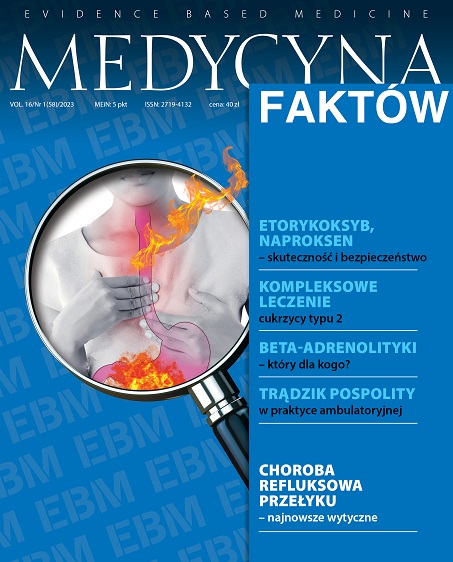Profile pacjentów – leki β-adrenolityczne (nebiwolol, bisoprolol, metoprolol, karwedilol) Opis przypadku
##plugins.themes.bootstrap3.article.main##
Abstrakt
β-adrenolityki stanowią trzon armamentarium lekarzy opiekujących się pacjentami z szeroko pojętymi chorobami sercowo-naczyniowymi [1]. Skuteczność przedstawicieli tej grupy leków w różnych wskazaniach oraz korzystny profil bezpieczeństwa przełożyły się na popularność tych leków. Dysponujemy obecnie danymi potwierdzającymi wpływ na redukcję śmiertelności określonych grup chorych po zastosowaniu danych molekuł z tej grupy. Na przestrzeni ostatnich dekad β-adrenolityki były bardzo często stosowanymi lekami. Przeprowadzono szereg badań, których celem było wyznaczenie optymalnego leku dla określonej grupy pacjentów. Warto mieć jednak na uwadze, że istnieją znaczące różnice pomiędzy poszczególnymi przedstawicielami tej grupy leków, a zalecaną terapię należy każdorazowo indywidualizować. Obecnie dysponujemy lekami silnie kardioselektywnymi, dzięki czemu istnieje możliwość ograniczenia wpływu tych leków poza układ sercowo-naczyniowy. Głównymi przedstawicielami β-adrenolityków najczęściej przepisywanymi pacjentom są: bisoprolol, metoprolol, nebiwolol oraz karwedilol.
##plugins.themes.bootstrap3.article.details##
Copyright © by Medical Education. All rights reserved.
Bibliografia
2. The Cardiac Insufficiency Bisoprolol Study II (CIBIS-II): a randomised trial. Lancet. 1999; 353(9146): 9-13.
3. Flather MD, Shibata MC, Coats AJ et al. Randomized trial to determine the effect of nebivolol on mortality and cardiovascular hospital admission in elderly patients with heart failure (SENIORS). Eur Heart J. 2005; 26(3): 215-25.
4. Hjalmarson A, Fagerberg B. MERIT-HF mortality and morbidity data. Bas ic Res Cardiol. 2000; 95(suppl 1): I98-103.
5. Packer M, Fowler MB, Roecker EB et al. Effect of carvedilol on the morbidity of patients with severe chronic heart failure: results of the carvedilol prospective randomized cumulative survival (COPERNICUS) study. Circulation. 2002; 106(17): 2194-9.
6. Gheorghiade M, Colucci WS, Swedberg K. Beta-blockers in chronic heart failure. Circulation. 2003; 107(12): 1570-5.
7. Chatterjee S, Biondi-Zoccai G, Abbate A et al. Benefits of β blockers in patients with heart failure and reduced ejection fraction: network meta- analysis. BMJ. 2013; 346: f55.
8. Knuuti J, Wijns W, Saraste A et al. 2019 ESC Guidelines for the diagnosis and management of chronic coronary syndromes. Eur Heart J. 2020; 41(3): 407-77.
9. Hindricks G, Potpara T, Dagres N et al. 2020 ESC Guidelines for the diagnosis and management of atrial fibrillation developed in collaboration with the European Association for Cardio-Thoracic Surgery (EACTS). Eur Heart J. 2021; 42(5): 373-498.
10. Olshansky B, Rosenfeld LE, Warner AL et al. The Atrial Fibrillation Follow-up Investigation of Rhythm Management (AFFIRM) study: approaches to control rate in atrial fibrillation. J Am Coll Cardiol. 2004; 43(7): 1201-8.
11. Williams B, Mancia G, Spiering W et al. 2018 ESC/ESH Guidelines for the management of arterial hypertension. Eur Heart J. 2018; 39(33): 3021-104.
12. Tykarski A, Filipiak KJ, Januszewicz A et al. Zasady postępowania w nadciśnieniu tętniczym – 2019 rok. Nadciśnienie Tętnicze w Praktyce. 2019; 5(1): 1-86.
13. McDonagh TA, Metra M, Adamo M et al. 2021 ESC Guidelines for the diagnosis and treatment of acute and chronic heart failure. Eur Heart J. 2021; 42(36): 3599-726.
